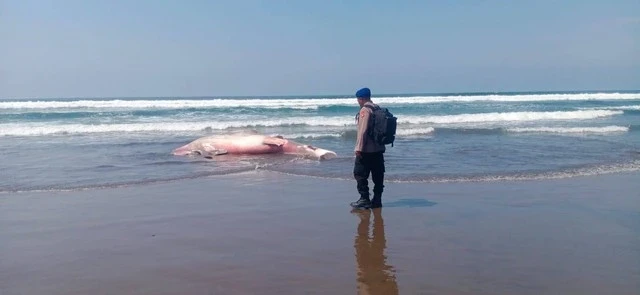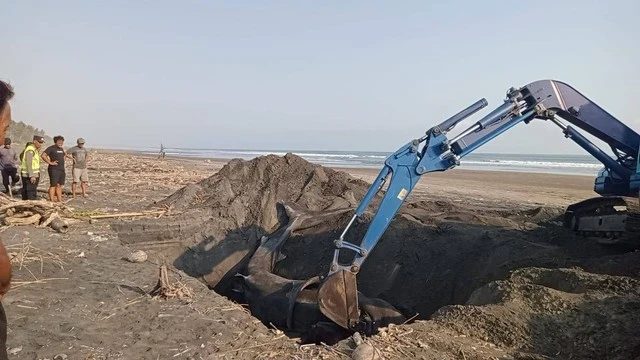Residents of Jembrana, who went to the ocean at dawn, were in for an unpleasant surprise. The carcass of a large underwater creature – a whale shark, as later revealed – was floating on the waves, having died before reaching the shore.

The cause of death of this animal, protected by the Indonesian government, is unclear. By the time it was discovered, the fish had already started to decompose, so it was promptly buried, with only a brief external examination and measurements conducted.
A similar scene was observed by local residents two weeks earlier when another, larger shark was washed ashore on the same beach (Yeh Kuning). While the latter measured 6.6 meters in length, the former measured 7.5 meters. These are considered medium-sized sharks, as adults can reach lengths of up to 10 meters.
No open wounds or signs of illness were found on any of the fish, leading specialists to believe that poachers did not kill them during hunting. However, the possibility of the predators colliding with reefs while searching for food is not ruled out. This, allegedly, could have led to the death of the animals.
The sharks were buried on the same beach at a safe depth in accordance with sanitary standards.

Throughout this year, there have already been three such cases. In addition to the two dead sharks discovered this month, there was another one. It washed ashore in June.
The whale shark (Rhincodon typus) is listed in Appendix II of the Convention on International Trade in Endangered Species of Wild Fauna and Flora (CITES) and is included in the Red List of the International Union for Conservation of Nature (IUCN) as a species facing the threat of extinction.
Not only whale sharks, or as they are also called, spotted sharks, have been found near the shore this year. Sperm whales and dolphins have also been stranded. Therefore, Balinese officials increasingly urge the population to care for the marine ecosystem. Specifically, they advise against disposing of plastic waste in the sea, as it poses a danger to flora and fauna.
Plastic is one of the reasons marine animals may engage in suicidal behavior. While this theory is not confirmed, traces of petroleum products and polyethylene are sometimes found in the respiratory organs of stranded sharks. Supporters of this theory believe that animals intentionally choose suicide when survival in polluted waters becomes impossible.
Another common theory that could explain the cases of dead sharks appearing on different beaches worldwide is viruses. Experts mention morbillivirus infection, which leads to unexplained changes in behavior. Infected sharks may be washed ashore or venture into atypical areas. Diseased fish gradually weaken, and if healthy individuals hide in the depths during storms, the sick ones may be thrown far onto the shore by waves. The virus begins to multiply in warm temperatures with a lack of oxygen.
The sharks' "natural compass" can also be disrupted by changes in electromagnetic vibrations caused by the movement of tectonic plates. In such cases, marine predators become disoriented in vast spaces and end up stranded on the shore.
You can add one right now!